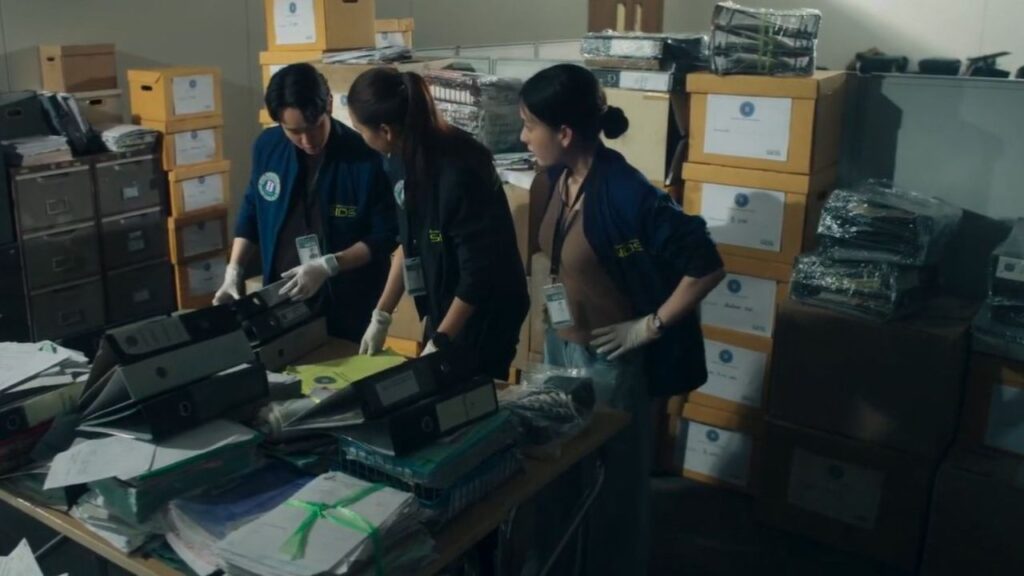GL series with crime are rare, but they’re unforgettable. Especially when they come wrapped in grit, intensity, and the emotional depth only a few stories dare to explore.

If you’ve been craving a Thai GL that fuses romance with investigation, Petrichor delivers exactly that, boldly and unapologetically.
This isn’t about schoolgirl crushes or soft-focus stares. It’s about crime scenes, corrupted systems, and two women navigating love while uncovering truth. Here, intimacy is forged in blood, tension, and the quiet courage to resist what’s broken.
For those who think GL means only light stories or slow glances across classrooms, think again. Petrichor introduces a relationship grounded in shared purpose and moral conviction, wrapped in a plot that dares to go beyond. And this? This might just be the start of a genre shift.

Table of Contents
- When love meets forensics: the plot that breaks the mold
- Dr. Cherran: silence, science, and subversion
- Tul: emotion, instinct, and unyielding fire
- More than a ship: why petrichor stands out
- A GL for the thinking viewer
- Reasons to watch (even if you’re skeptical)
- A new era for thai gl?
- Love and autopsies, who knew?
When love meets forensics: the plot that breaks the mold
Forget the schoolyard crushes and love triangles you’ve seen before. Petrichor drops us straight into crime scenes, power struggles, and a justice system full of cracks. At the center of it all? Tul and Cherran, two women brought together by bloodstains and broken systems.
Tul is a rookie officer, idealistic and emotionally driven. Her sense of right and wrong is fierce but unpolished. Cherran, in contrast, is a composed forensic physician, precise and grounded. Their approaches couldn’t be more different, and that’s exactly what makes their dynamic compelling.
What begins as friction slowly unfolds into understanding. While they analyze evidence and face institutional pressure, they start decoding each other’s truths. This is where Petrichor sets itself apart from any other GL series with crime elements: the investigation becomes emotional, personal, and profoundly human.
Their chemistry isn’t just about attraction. It’s about shared resistance. In a system that favors the powerful, they choose integrity. In a world that demands detachment, they choose empathy. And in a genre often defined by tropes, they carve something startlingly new.

Dr. Cherran: silence, science, and subversion
She doesn’t raise her voice. She doesn’t chase criminals down dark alleys. But Dr. Cherran might be the most powerful presence in Petrichor. Her strength isn’t loud; it’s measured, steady, and often unsettling in its clarity.
As a forensic physician, Cherran works behind the scenes. But in this GL series with crime and conscience, her role is anything but secondary. Her scalpel doesn’t just cut flesh; it cuts through stories, distortions, and systems built to protect the powerful.
Each autopsy is a form of resistance. Each lab result, a refusal to let truth be buried with the dead. In a country where corruption often muddies justice, Cherran offers something radical: certainty.
And yet, she isn’t cold. Her empathy comes in glances, pauses, and the weight she carries after every case. You see it in the way she speaks to grieving families. In how she reads silence like a second language.
When Tul enters her life, their contrast becomes fuel. Tul’s emotion meets Cherran’s reason. It shouldn’t work, yet it does. Because love here isn’t about grand declarations. It’s about small moments of trust in the face of chaos. And in this story, trust might be the most intimate thing of all.

Tul: emotion, instinct, and unyielding fire
Tul storms into the frame like a match struck in darkness. She’s impulsive, instinctive, and unapologetically emotional. She doesn’t play by the rules, because the rules were never built for people like her.
Where Cherran dissects evidence with silence, Tul questions everything out loud. She challenges protocol. She lets her anger show. But this fire isn’t reckless; it’s righteous. It comes from seeing injustice up close and choosing not to flinch.
In many GL series with crime narratives, queer women are either stoic professionals or emotionally entangled victims. Tul refuses both roles. She’s flawed, yes, but deeply human. And that humanity drives her to protect others, even when it puts her at risk.
What makes her arc compelling is that she doesn’t change to fit the system. She learns how to fight smarter within it. Her growth isn’t about control, but direction. About using her emotional depth as a compass rather than a weapon.
Cherran doesn’t try to tame Tul. Instead, she makes space for her. And that quiet acceptance, without conditions or corrections, becomes one of the most tender undercurrents in the story. Together, they’re not opposites. They’re the friction that sparks change.

More than a ship: why petrichor stands out
What truly elevates Petrichor is its refusal to settle for formula. It doesn’t treat romance as an accessory or crime as a dramatic prop. Instead, both are integral, woven into a narrative that respects its characters and its audience.
There are no jealous exes lurking in the shadows. No forced misunderstandings. No sudden betrayals for the sake of tension. This is a story about women who communicate, disagree, grow, and still choose each other. That kind of emotional maturity is rare in queer storytelling, especially in a GL series with crime elements.
The love here isn’t loud or overly sweet. It’s subtle, thoughtful, even hesitant. But that hesitation is what makes it powerful. It comes from two people who know pain, who carry responsibility, who’ve learned the cost of trust. So when they begin to open up, it matters.
And then there’s the crime. Not exaggerated, not glamorized. The procedural parts are smartly paced, with moral dilemmas that don’t have easy answers. Each case feels like a mirror, forcing Tul and Cherran to confront pieces of themselves they’d rather avoid.
Petrichor doesn’t beg for attention. It earns it, scene by scene. And that’s exactly why it stays with you, long after the final frame fades.

A GL for the thinking viewer
Petrichor stands apart as a GL series with crime that respects its audience’s intelligence. It doesn’t settle for surface-level drama or simple love stories. Instead, it challenges viewers to engage with complex themes like power dynamics, trauma, grief, and moral ambiguity, all while weaving a deeply tender romance.
The show never shies away from the darker sides of justice. Tul and Cherran work within a system that often protects the privileged and ignores the vulnerable. Their cases reveal societal fractures, forcing the audience to question who really holds power and who pays the price.
Yet, even amid the weight of these issues, the series carves out moments of quiet intimacy and vulnerability. It’s in those small glances, brief touches, and shared silences that the heart of the story beats strongest.
The balance between thought-provoking narrative and emotional depth makes Petrichor more than just another GL series with crime elements. It becomes a mirror reflecting the messy realities of life and love.
This is storytelling that invites reflection. It asks: How do you hold onto compassion when faced with injustice? How do you love without losing yourself? Petrichor offers no easy answers, but it rewards viewers who are willing to think and feel deeply.

Reasons to watch (even if you’re skeptical)
If you think you’ve seen it all in GL series with crime, Petrichor will prove you wrong. This show brings a level of maturity and polish that sets it apart from typical fare.
The chemistry between Engfa and Charlotte is undeniable, but it’s their acting growth that truly captivates. They bring depth and nuance to their roles, showing characters who are flawed yet relatable.
The writing refuses to fall into cheap drama traps. There are no homophobic parents preaching hate, no random love rivals popping up out of nowhere, and no cringe-worthy clichés dragging the story down. Instead, the focus stays on two women navigating their careers, personal demons, and a complex relationship.
What makes this GL series with crime stand out is how it portrays a healthy, honest romance. Their bond feels earned, built on mutual respect, trust, and genuine affection. The intimacy scenes are tastefully done and yes, they’re steamy, but never gratuitous.
Even skeptics will find themselves drawn in by the strong storytelling, thoughtful character development, and the way Petrichor balances crime procedural elements with heartfelt romance. It’s a rare gem that deserves attention.

A new era for thai gl?
Petrichor demonstrates that Thai GL is no longer confined to the usual romantic tropes or light-hearted stories. This GL series with crime shows that the genre can tackle serious themes without losing the emotional core that fans crave. It’s a bold step forward, blending genre conventions to create something truly fresh and engaging.
The narrative pushes boundaries, exploring not only romance but also societal issues like corruption, justice, and moral ambiguity. This adds layers of depth, inviting viewers to think critically while still getting invested in the characters’ journey. Thai GL has matured, proving it can hold its own alongside other genres known for complexity and grit.
What’s exciting is the potential for this evolution to continue. If Petrichor is any indication, more productions will take risks, mixing crime, suspense, and heartfelt storytelling. The buzz around ClaireBell suggests she might soon join this wave, possibly delivering another GL series with crime elements that captivates audiences.
This shift signals that GL is not just a niche for teenage fantasies but a versatile lens capable of reflecting real struggles and triumphs. With Petrichor setting the standard, the future of Thai GL looks promising, and it might just redefine how we see queer storytelling on screen.

Love and autopsies, who knew?
Petrichor proves that a GL series with crime can be more than just surface-level drama or romantic fluff. It’s rare to find a show that balances emotional depth with intellectual rigor, offering both heartfelt romance and a gripping dive into forensic investigation.
The intertwining of love and autopsies creates a unique narrative texture, challenging viewers to engage with complex themes without sacrificing the chemistry between the leads.
This series doesn’t shy away from the darker, sometimes uncomfortable truths beneath the surface. It respects the intelligence of its audience, weaving social commentary and moral questions seamlessly into the plot. For those tired of predictable storylines, Petrichor feels like a breath of fresh air, a mature exploration of what it means to seek truth in both crime scenes and relationships.
Of course, this isn’t a show for everyone. If you prefer light-hearted romance without any grit or tension, it may not be your cup of tea. But for viewers craving a GL series with crime elements that pushes boundaries and offers genuine complexity, Petrichor stands out as a must-watch.
So, if you’re ready to experience a story that challenges your mind and warms your heart, this is where your journey should begin.
Watched Petrichor already? What did you think? More crime, more depth, or more GL like this?

Featured image: Promotional still courtesy of IQIYI.



